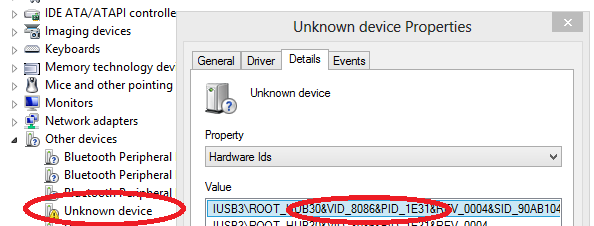Originally authored by: Jerome Myers, December 1, 2012
Update 3/5/2015: See our related post: Windows 8.1 and the ASMedia USB 3.1 XHCI 1.1 Host Controller
Important Notice: As of Windows 8.1, we don’t recommend replacing the in-box Windows USB 3.0 stack with the Intel Windows 7 stack, as described in this post. This post is being kept for historical background, but we recommend working with your computer manufacturer and/or Microsoft on any remaining issues with the built-in Windows 8.1 USB 3.0 stack. Feel free to also comment below if problems remain but Plugable cannot offer technical support or take any responsibility for any issues this process may cause to your computer. Continue at your own risk.
One of the new features of Windows 8 is the built in XHCI host controller software and USB stack. While this brings some benefits like UASP support, there are some devices that currently don’t work with the Microsoft stack on the Intel USB 3.0 host controller. This can be fixed by forcing Windows to use the Intel USB 3.0 host controller drivers instead of the built in stack.
*NOTE* These instructions are only for machines with an Intel eXtensible Host Controller. Look for the Intel(R) USB 3.0 eXtensible Host Controller under Universal Serial Bus controllers in Device Manager.

First, download the latest driver package from Intel. It’s currently at version 1.0.6.245 and can be downloaded from the following link:
Intel(R)_USB_3.0_eXtensible_Host_Controller_Driver rev. 1.0.6.245
Once the download has finished, extract the .zip file to a known location.
Now download these two .inf files which have been modified to allow the Intel driver to install on Windows 8:
iusb3hub.infiusb3xhc.inf
We are going to replace the existing versions of these two files with the ones we just downloaded. Place the files in the following directory of the unzipped driver package and click yes when Windows warns that we are over writing a file with the same name:
Intel(R)_USB_3.0_eXtensible_Host_Controller_Driver\Drivers\Win7\x64\
This will update these two infs with the modified versions that will allow the Intel driver to install on Windows 8 when the Host Controller and USB hub drivers are updated.
To install the Intel drivers in place of the in box XHCI stack, we’ll have to temporarily disable Driver Signing Enforcement. To do this press the Windows key + R and in the run box type:
shutdown.exe /r /o /f /t 00
Now make the following selections to boot into the Start Up Setting Screen
Troubleshoot — Advanced options — Start Up Settings — Restart
Then, when the machine restarts, select “Disable driver signature enforcement”. Your machine will start with Driver signing enforcement disabled until the next reboot.
When the machine restarts, open Device Manager (win + r, devmgmt.msc). Double click on the entry for the Intel(R) USB 3.0 eXtensible Host Controller and select the Drivers tab. You should see that the driver provider is Microsoft.

Now click “Update Driver” and then select “Browse my computer for driver software”.
Next choose “Let me pick from a list of device drivers on my computer”.
Next, select “Have Disk”.
In the Window that pops up titled “Install From Disk” choose “Browse” and navigate to the location where we replace the original infs with the two modified .inf files we downloaded earlier. Select iusb3xhc.inf and click ok.
Windows will warn that the driver is not signed and will require you to confirm the installation.
Once the installation is complete, reboot the machine following the same procedure as above:
shutdown.exe /r /o /f /t 00
Now make the following selections to boot into the Start Up Setting Screen
Troubleshoot — Advanced options — Start Up Settings — Restart
When the machine starts, select “Disable driver signature enforcement”. Your machine will start with Driver signing enforcement disabled until the next reboot. Once logged in, open Device Manager (win + r “devmgmt.msc”) and locate the entry under Other devices for an Unknown device, to find the correct one, double click on the entry for the unknown device view the details tab. Make sure it has the VID_8086.

Once you have located the correct device right click on it and choose “Update Driver” Choose “Browse my computer”, Windows will ask you to identify the type of device, scroll down and select “Universal Serial Bus Devices”.
Click next, choose “Have Disk”, “Browse” and select the modified iusb3hub.inf that we placed in the Intel(R)_USB_3.0_eXtensible_Host_Controller_Driver\Drivers\Win7\x64\ folder earlier and click ok.
Again, Windows will warn about driver signing, when the install is finished, reboot your machine.
When it restarts look at the driver tab for the Intel(R) USB 3.0 eXtensible Host Controller and the Intel(R) USB 3.0 Root Hub to confirm that you are now running the Intel drivers.
To return to the built in Microsoft USB 3.0 driver stack, use the uninstall drivers button from the driver tab in device manager. When it’s finished, select the Action menu of Device Manager and “scan for hardware changes” Windows should find the Intel USB 3.0 host controller and re-install it using the built in Microsoft XHCI stack.
Thanks to Ekko for his original work on this. Please comment below if you have any corrections or refinements. We’d also love to have comments mentioning the problems you were having, and whether the Intel stack solved them for you. Thanks!


